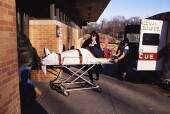
MONDAY, Aug. 18, 2014 (HealthDay News) — Deaths and hospitalizations for heart disease and stroke have dropped dramatically in the United States over the past decade, according to a large study of Medicare patients.
The declines noted from 1999 to 2011 are the result of lifestyle changes, better treatment and effective preventive measures, the researchers said.
“The findings are jaw-dropping,” said lead researcher Dr. Harlan Krumholz, a professor of cardiology at the Yale School of Medicine in New Haven, Conn. “They really show that we have begun to reverse this epidemic of heart disease and stroke.”
Krumholz’s team reviewed data on nearly 34 million Americans covered by Medicare, the publicly funded insurance program for older people. They analyzed trends in rates of hospitalization, dying within a month of being admitted to a hospital, being admitted again within a month and dying during the following year.
By the end of 2011, hospitalization rates for heart attacks had dropped 38 percent. Rates of unstable angina (sudden chest pain that can signal a heart attack) fell almost 85 percent. And hospitalizations declined about one-third for both heart failure and stroke, the researchers found.
“Through improved quality of care, we have markedly cut down the risk of dying when you are hospitalized with these conditions,” Krumholz said.
The risk of death within a year after hospitalization for unstable angina or heart attack dropped by more than 20 percent. And risk of death after hospitalization for heart failure and stroke declined 13 percent, the researchers found.
These declines were greater than for any other medical condition, the researchers said. And no “miracle” treatments came out during this time period, Krumholz said.
“There is a path to reverse epidemics borne of lifestyle rather than from infectious causes,” Krumholz said.
Certainly, emphasis on healthy diets and exercise has helped, he and other experts said.
Use of high-blood pressure medication, widespread acceptance of statin drugs to control cholesterol levels, and significant reductions in cigarette smoking have also helped bring these improvements about, Krumholz said. Faster and better treatment for heart attack has saved lives as well, he said.
“No one thought this kind of progress was possible in this short period of time,” Krumholz said.
While the statistics are encouraging, the fight against heart disease continues, he said. “Heart disease is still the leading cause of death, and there is still work to be done,” he added. “We’ve got to continue pushing this until we put all the cardiologists and neurologists out of business.”
The report was published online Aug. 18 in the journal Circulation.
Dr. Gregg Fonarow, a spokesman for the American Heart Association, called the reductions in deaths and rehospitalizations “remarkable.”
“This important new study documents a substantial improvement in outcomes for Medicare patients hospitalized with heart attack, heart failure and stroke,” said Fonarow, who is also a professor of cardiology at the University of California, Los Angeles.
During the period reviewed there were substantial efforts led by the American Heart Association, American Stroke Association and American College of Cardiology to improve the quality of care and outcomes for these conditions, Fonarow said.
“This analysis suggests these efforts contributed to a substantial number of lives saved and hospitalizations avoided,” he said.
“Going forward,” Fonarow added, “there are opportunities to further extend these efforts to optimally implement evidence-based, guideline-directed therapies to reduce deaths and hospitalizations even more.”
More information
For more information on heart attack and stroke, visit the American Heart Association.
Copyright © 2025 HealthDay. All rights reserved.

